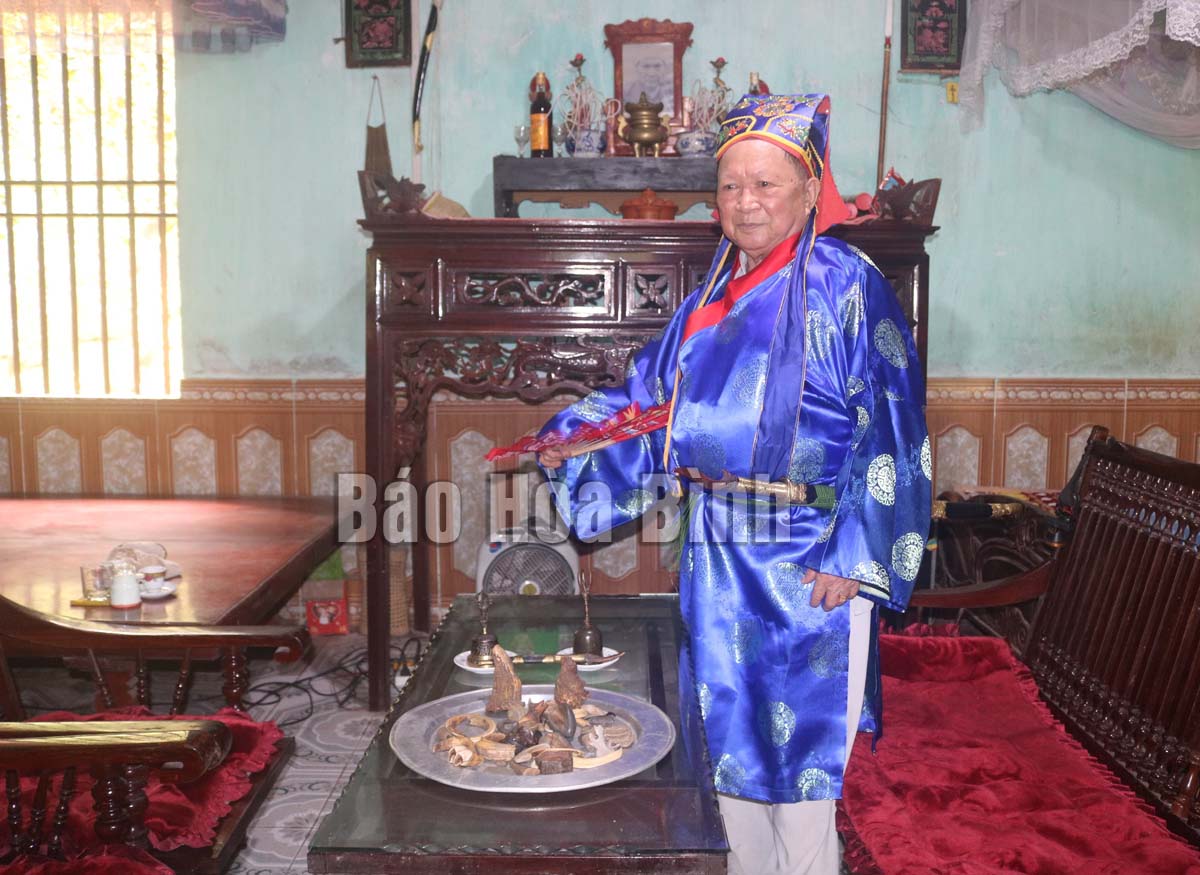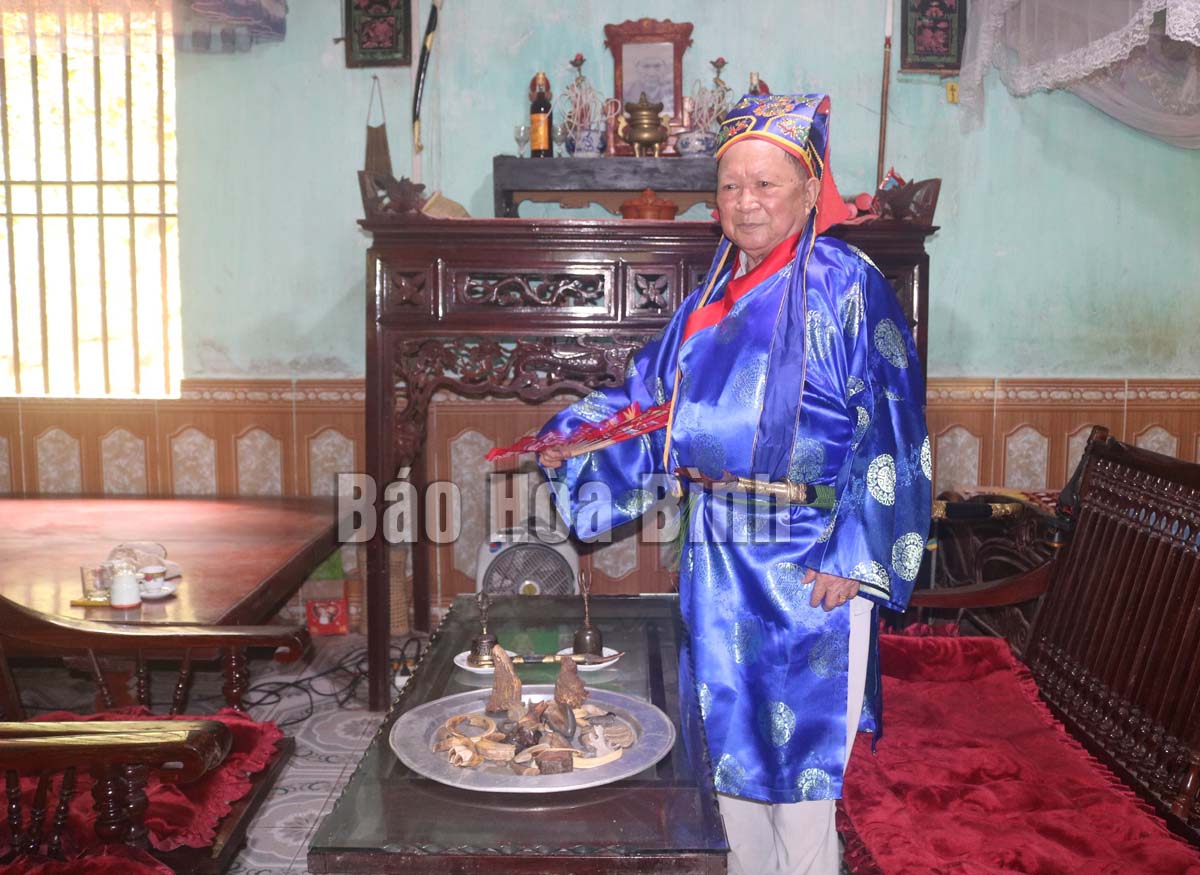
(HBO) - Over their long history, the Muong ethnic group in Hoa Binh has created and preserved a rich and diverse folk culture, in which the Mo Muong is a prominent and unique one that has profound human values. Generations of Muong people have passed down Mo Muong verbally, giving vitality and popularity to this special intangible cultural heritage.

Shaman Bui Hong Bao in Tan
Lac district’s Phong Phu commune performs a Mo ritual.
Mo Muong is a rite of reciting Mo (poetry) during rituals of the Muong
people, in which the Thay mo (shaman) plays the main role. The shaman knows by
heart not only tens of thousands of lines of Mo but also traditional
rituals and customs. In Muong society, the shaman is an intellectual and a
reputable person in the community.
Mo Muong recitations are part of 23 Muong rituals, including funerals, in
which tens of thousands of Mo lines are recited throughout 12 days and
nights, which demonstrates the essence and core values of the Mo tradition.
Currently, there are many collections of Mo versions, of which three main ones
have been published.
In order to well preserve and promote the intangible cultural heritage, the
provincial Party Committee has issued many important documents in the field of
culture, which identify Mo Muong as one of the heritages that need to be
preserved and promoted.
The provincial People's Committee has established a Steering Committee for Mo
Muong Hoa Binh and built a plan to make a scientific dossier on Mo Muong which
will be submitted to the Ministry of Culture, Sports and Tourism to seek
recognition of Mo as part of the national heritage, looking toward seeking
recognition as an intangible cultural heritage of humanity.
In 2018, the provincial People's Committee approved two projects on preserving
and promoting the typical intangible cultural values of the Muong ethnic group
in the 2018 - 2030 period and preserving and promoting the values of Mo Muong
Hoa Binh cultural heritages in 2019 - 2025 periods and the following years.
Party committees, authorities and relevant agencies have carried out
synchronously solutions to protect and promote the value of cultural heritage
in general and Mo Muong heritage in particular in a scientific manner. They
have also popularized the value of heritage, thereby raising awareness and
responsibility in jointly protecting cultural heritages among local residents.
With an increasingly vibrant and widespread emulation movement aimed at building cultured residential areas and cultured families, Yen Thuy District has been making steady progress toward improving both the material and spiritual well-being of its people, while fostering a civilized, prosperous, beautiful, and progressive community.
Once lacking recreational spaces and community facilities, Residential Group 2 in Quynh Lam Ward (Hoa Binh City) has recently received attention for the construction of a new, spacious, and fully equipped cultural house. The project followed the model of state support combined with public contributions in both labor and funding.
The "All people unite to build cultural life" movement, which has been effectively integrated with Kim Boi district’s socio-economic development goals, is fostering a lively spirit of emulation across local residential areas, hamlets, villages, public agencies, and enterprises. In addition, through the initiative, traditional cultural values are being preserved and promoted, while community solidarity and mutual support in poverty reduction and economic development are being strengthened.
A working delegation of the Hoa Binh provincial People’s Committee led by its Permanent Vice Chairman Nguyen Van Toan on June 11 inspected the progress of a project to build the Mo Muong Cultural Heritage Conservation Space linked to tourism services in Hop Phong commune, Cao Phong district.
Born and growing in the heroic land of Muong Dong, Dinh Thi Kieu Dung, a resident in Bo town of Kim Boi district, in her childhood was nurtured by the sweet lullabies of her grandmother and mother. These melodies deeply imprinted on her soul, becoming an inseparable part of her love for her ethnic group's culture. For over 20 years, this love for her hometown has driven Dung to research, collect, and pass down the cultural values of the Muong people to future generations.
In the final days of May, the Ethnic Art Troupe of Hoa Binh Province organized performances to serve the people in remote, mountainous, and particularly disadvantaged areas within the province. These were not just ordinary artistic shows, but they were the meaningful journeys aimed at spreading cultural values, enhancing the spiritual life of the people and contributing to the preservation of ethnic minority cultural identities.



